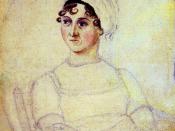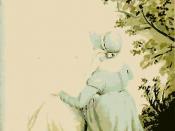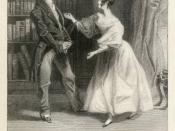Throughout Pride and Prejudice, there dwells the omnipresent theme of marriage. Opinions on this complex subject vary from character to character in Jane Austen's book, but one aspect remains the same -- the notion that the institution is a necessary step in the economical and political maturity of a young adult. This idea is present in all of Austen's characters. Some, like Jane and Elizabeth, believe rather strongly that love, or companionship, is an integral part of marriage, while others, most notably Mrs. Bennet, view the institution solely as a means of enhancing one's station in life -- love is of secondary, if any importance.
Happiness in marriage is entirely a matter of chance. ...They always continue to grow sufficiently unlike afterwards to have their share of vexation, and it is better to know as little as possible of the defects of the person with whom you are to pass your life.
(21) These lines, uttered by Charlotte Lucas, typify the prevalent opinion that marriage is not bound by the idea of "felicity." It is logical to assume that, since Charlotte does not see marriage as a relationship founded on emotion, she must see it as a institution of status -- not love. This strongly pragmatic view of marriage is also shared by Mrs. Bennet. However, due to the intelligence, or lack thereof, displayed by Mrs. Bennet, it seems that her practical view of marriage results from a conditioning brought about by the society and times she lives in. In many instances, Mrs. Bennet demonstrates, however unwittingly, her belief that the marriage of her daughters is an achievement which every civil mother should aspire to, but that their happiness in that marriage is unimportant: Not that I care about it, though. He is nothing to us, you know, and I...


